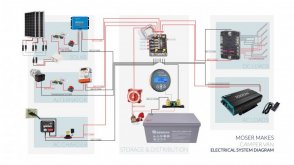Directly connected, a lithium battery will soak up all the amperage it can get out of a vehicles alternator. That has the potential of overloading the alternator, and possibly shortening its life.
A good DC-DC Charger of the appropriate size will limit the charge current made available to the house/auxiliary battery, will deliver that current at the proper voltage (depending on the battery type), which in turn can help prolong the life of your alternator and protects the battery, wiring, and attached systems. Victron, Sterling Power, Redarc all make high quality DC-DC Chargers of various capacities.
A DC-DC Charger in itself will not protect your alternator. It's important to chose one that will not allow more current to pass than is available so as to not overload the alternator. A friend decided his 30A wasn't big enough, so he replaced it with a 50A version. This however meant he also needed to fit a larger alternator and larger wiring. Spendy!
For a much better and more accurate explanation, Victron has an excellent
video on how not to kill your alternator and burn your vehicle.



